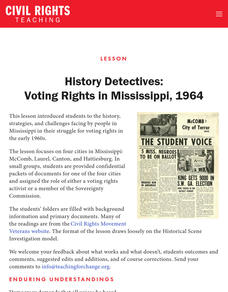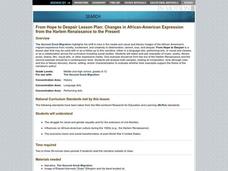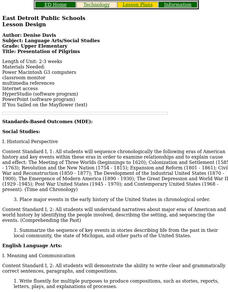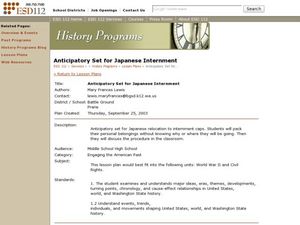Curated OER
Lesson 9- Billy Wilder: Film Noir Inventor and Genius
Students study what influenced and inspired Billy Wilder while determining the plot, characters, and historical context of the film Double Indemnity. They investigate the stereotypes of Film Noir and how it shows the media messages of...
Teaching for Change
History Detectives: Voting Rights in Mississippi, 1964
Promises made and promise broken. Spies and activists. Voting rights in Mississippi are the focus of a lesson that has class members research the history of the struggle in Mississippi. Learners take on the role of voting rights...
US House of Representatives
Black Americans in Congress Speak Their Mind
To conclude their study of Black Americans in Congress, groups select a statement made by one of the Members, examine the Member's profile on the provided link, and create a display that includes state represented, years of service, an...
Curated OER
Teaching With Documents: Powers of Persuasion - Poster Art of World War II
Young scholars analyze 11 posters from wartime and complete a worksheet. They discuss the similarities and differences between the posters and where the posters might have been posted. Student volunteers from each group present the...
Curated OER
Friends or Foes?
Students discuss Spain's relationship with Europe and the U.S. and research incidents of American-European disagreements regarding international actions and policy. They write essays on how the world might be different if a multipolar...
Curated OER
Post War Effects on Los Angeles
Eleventh graders research before and after pictures of a specific area of downtown Los Angeles. They create a poster depicting the changes.
Curated OER
Eckstine, Stayhorn, and the Dorseys: Masters of Swing
Students explore the history of swing music. In this music history lesson, students research the Dorsey Brothers, Billy Eckstine, and William Strayhorn to learn about swing music. Students define swing, develop a timeline of events in...
Curated OER
Dictator for the Day
Students experiment with being a dictator and sorting students into "desirable" and "undesirable" groups. They discuss freedoms and contrast U.S. government to dictatorships.
Delegation of the European Union to the United States
The Founding and Development of the European Union
How did Europe transition from a period of conflict to a period of sustained peace? As class members continue their study of the history and development of the European Union, groups examine the events in six time periods, from the...
Curated OER
WWII Newspaper Using the Team Interview Model
Students interact with each other to conduct interviews after conducting meaningful research about the era of World War II. The interview is conducted in a group and then can be presented to another group or the whole class.
Curated OER
Genocide-Holocaust
Twelfth graders gain insight and perspective as to how and why the Holocaust occured. They explain why the specific groups were targeted, and complete a brief paragraph about what it would have been like to live during this era.
Curated OER
Unit on Gandhi and Ahimsa
Students explore the history of Gandhi and his viewpoint and example of nonviolence. In this World History lesson, students complete numerous research assignments and activities over the course of nine lessons to expand their...
Curated OER
Decolonization and Self-Determination
Students define and discuss colonialism and self-determination. After reading the European's view on the topic, they analyze a map of imperialism in 1914. They watch excerpts of a video and take notes on various United Nations...
Curated OER
Telegram from Senator Joseph McCarthy to President Harry S. Truman
Students research the McCarthy hearings to determine the following: time frame of hearings, how they were broadcast, how the press reacted, and how the American people reacted in light of the Korean Conflict and the Cold War.
Curated OER
Afro-Caribbean Americans and the Sugar Economy
Pupils read the narrative, Caribbean Immigration and examine how sugar production and migration of people of African origin have been intertwined for centuries. Working in three groups, they present oral reports on the three eras of the...
Curated OER
Time Traveler Blues: The Great Depression
Students research the Great Depression Era and its effect on the world. They create a multimedia presentation over the Great Depression from many angles.
Curated OER
Urban Concentration and Racial Violence
Students research one of the many urban race riots in U.S. history, from the New York City riots during the Civil War to the "Red Summer of 1919" or the hate-strikes of 1943. They present their findings in the form of a newspaper's front...
Curated OER
Presentation of Pilgrims
Students are given a category to research (clothes, life before the New World, the voyage, etc.) about Pilgrim life. s Students, in groups, create presentations using software program such as PowerPoint.
Curated OER
Bob Dylan: No Direction Home
Students hold panel discussions on selected topics about the 1960s and their impact on modern-day events. As visual reinforcement, they watch the film about Bob Dylan and research the music of the period as well as his musical...
Curated OER
Reagan and Bush: The Conservative Years
Learners investigate the conservative agenda of the Republican Presidents Ronald Reagan and George Bush. They conduct Internet research, evaluate an edition of the Wall Street Journal, and write and publish a special-edition newspaper...
Curated OER
FDR's First Inaugural Address
Students, in groups, describe a photo to the class. They determine which New Deal program is depicted in each of the images based on the research they conducted.
Foreign Policy Research Institute
Understanding the Koreas
Though this resource was designed in 2005, US tension with North Korea remains a relevant topic for exploration and understanding. Unfortunately, this lecture and reading-based lesson is unlikely to engage the class. The end product is a...
Curated OER
Anticipatory Set for Japanese Internment
Learners simulate Japanese relocation to internment camps after the bombing of Pearl Harbor. They select items to pack that are personally, sentimentally, and financially important to them. They create a Venn diagram comparing and...






















